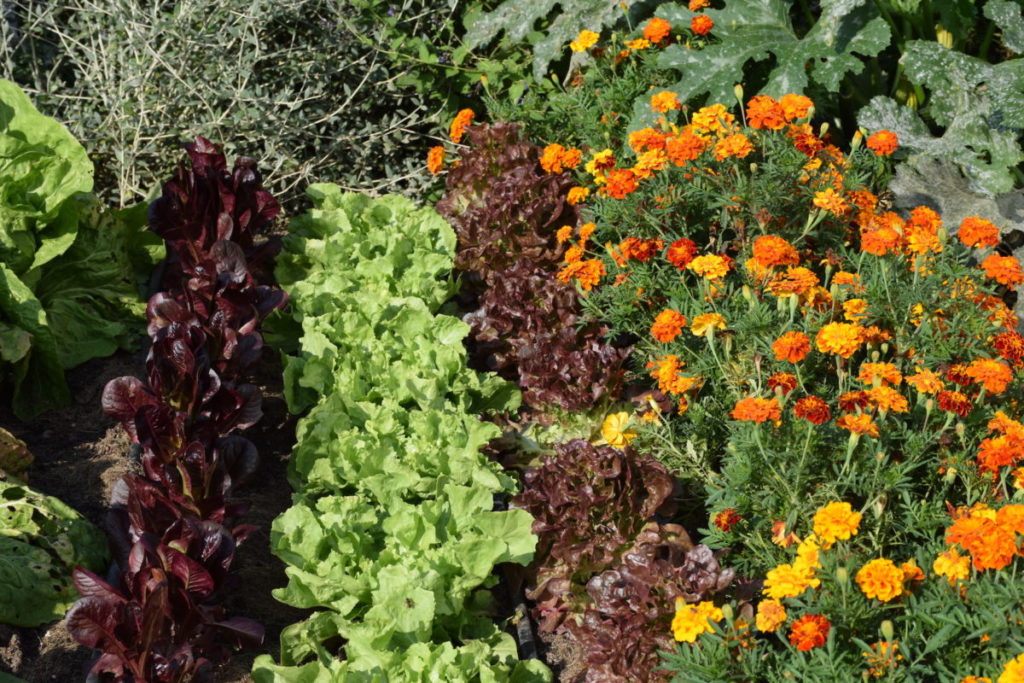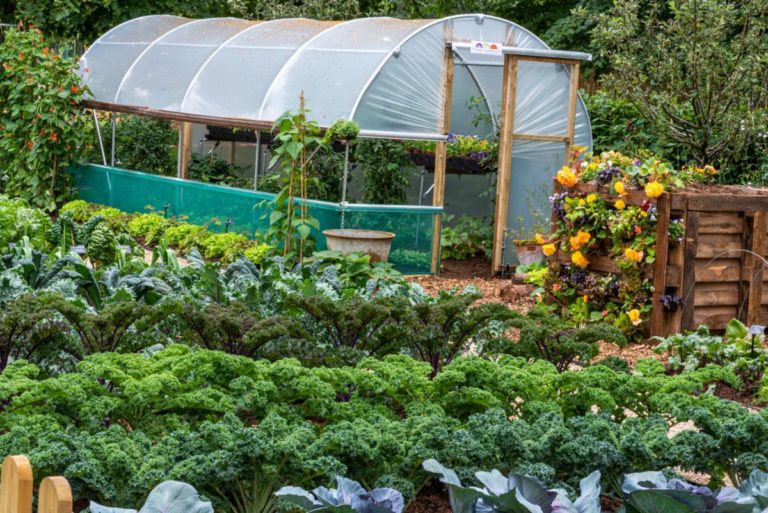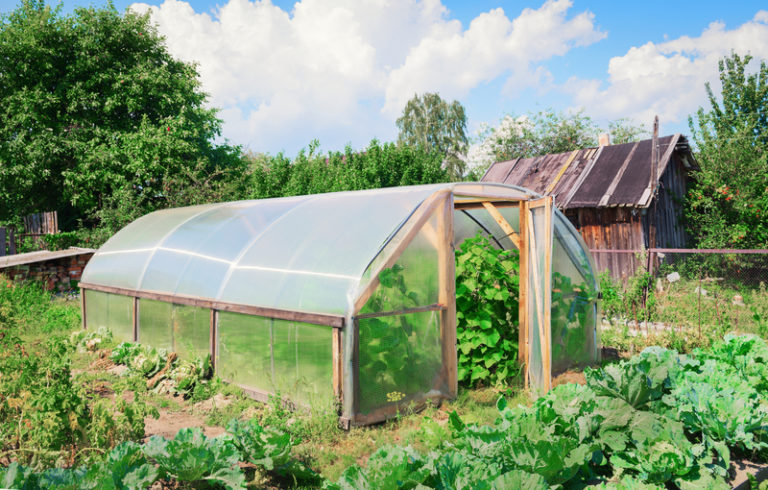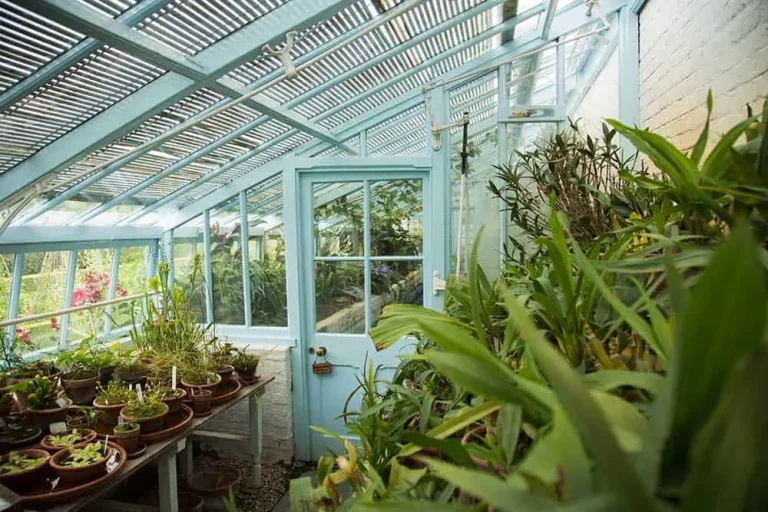Growing your own garden off the grid can be a rewarding and self-sufficient way of living.
However, one major challenge that many gardeners face is dealing with pests that can damage their crops.
Instead of relying on chemical pesticides, you can turn to nature’s solution by incorporating certain plants into your garden design that will naturally repel or kill pests, without harming the environment or your health.
We’ll explore some of the best plants to grow in your off-grid garden for natural pest control.
Basil
This fragrant herb repels a variety of pests, including flies, mosquitoes, and aphids. It’s also a great addition to homemade pest control sprays.
This fragrant herb emits a distinct aroma that deters these unwanted guests from sticking around.
To take advantage of basil’s pest-repelling properties, simply plant it in your garden or add it to your homemade pest control sprays.
You can use the leaves or the flowers of the basil plant to create a natural barrier against pests.
Basil has antifungal and antibacterial properties, making it an excellent addition to your pest control arsenal.
With its sweet and pungent scent, basil is a natural and effective way to keep pests at bay without using harsh chemicals.
So, if you’re looking for a simple and eco-friendly solution to your pest problems, consider adding some basil to your garden or homemade pest control sprays.
Garlic
Garlic has natural insecticidal properties and can be used to repel aphids, whiteflies, and other pests. It can be planted around the perimeter of your garden to keep pests away.
Planting garlic around the perimeter of your garden can be a highly effective and natural way to repel aphids, whiteflies, and other pests.
The insecticidal properties of garlic are due to its active compound, allicin, which is toxic to a wide range of pests.
When planted around the perimeter of your garden, the strong scent of garlic will repel these pests and keep them away from your valuable crops.
Garlic can be planted as a companion plant to other crops, such as roses, to enhance their resistance to pests and diseases.
To maximize its effectiveness, plant garlic in well-draining soil and keep the soil consistently moist.
By doing so, you can enjoy a pest-free garden and a bountiful harvest.
Nasturtium
The brightly colored flowers and leaves of nasturtium repel aphids, whiteflies, and other pests. It’s also a great addition to compost to add beneficial microorganisms.
Nasturtium is a versatile and beneficial plant that not only adds color and beauty to your garden, but also repels aphids, whiteflies, and other pests.
Its brightly colored flowers and leaves contain natural chemicals that deter these pests, helping to keep your plants healthy and pest-free.
In addition to its pest-repelling properties, nasturtium is also an excellent addition to your compost pile.
Its leaves and flowers are rich in beneficial microorganisms, such as bacteria and fungi, that help to break down organic matter and create a nutrient-rich compost.
By incorporating nasturtium into your garden and composting routine, you can create a more balanced and healthy ecosystem, and enjoy a bountiful harvest of both beautiful flowers and delicious, pest-free produce.
Radish
Radish can be used as a trap crop to lure pests away from your main crops. It’s also a great companion plant for tomatoes and other vegetables.
Radish is an excellent trap crop to lure pests away from your main crops.
Its strong scent and taste repel a variety of pests, such as cucumber beetles, aphids, and root maggots, which would otherwise feast on your other vegetables.
By intercropping radish with your main crops, you can effectively draw these pests away from your other plants and minimize damage.
Radish is a great companion plant for tomatoes and other vegetables.
Its rapid growth and shallow roots help to break up compacted soil and improve air circulation, benefiting the growth of nearby plants.
Moreover, radish’s taproot can help to pull up nutrients from deeper in the soil, making them available to other plants.
By incorporating radish into your vegetable garden, you can not only control pests but also improve the overall health and productivity of your plants.
Chives
Chives are a natural insect repellent and can be used to repel aphids, spider mites, and other pests. They also add beneficial nutrients to the soil.
Chives are a powerful natural insect repellent that can help protect your plants from harmful pests like aphids, spider mites, and more.
By planting chives alongside your garden beds, you can naturally deter these pests and keep your plants healthy and thriving.
But the benefits of chives don’t stop there – they also add important nutrients to the soil, improving its fertility and structure.
Chives are a good source of nitrogen, which is essential for plant growth, and their deep-rooted system helps to break up compacted soil and improve drainage.
By incorporating chives into your gardening routine, you’ll not only keep pests at bay, but also improve the overall health and productivity of your soil.
Cilantro
Cilantro is another fragrant herb that repels aphids and spider mites. It’s also a great addition to compost to add beneficial microorganisms.
Cilantro is a highly beneficial herb for your garden, providing multiple functions to improve soil health and repel pests.
Its strong fragrance deters aphids and spider mites, reducing the need for pesticides and other chemicals.
By planting cilantro in your garden, you can create a natural barrier against these pests, promoting a healthier and more sustainable growing environment.
Cilantro is an excellent addition to compost, as it contains a wealth of beneficial microorganisms that can help to break down organic matter and improve soil fertility.
When you compost cilantro, these microorganisms will multiply and improve the overall structure and fertility of your soil.
This makes cilantro an excellent choice for anyone looking to create a thriving and self-sustaining garden.
By incorporating this versatile herb into your gardening routine, you can enjoy healthier plants, reduce pests and diseases, and improve the overall health of your soil.
Dill
Dill is a natural pest control plant that repels aphids, spider mites, and other pests. It’s also a great companion plant for cucumbers and other vegetables.
Dill is a versatile and powerful natural pest control plant that can help protect your garden from a variety of unwanted pests.
Its strong scent and essential oils repel aphids, spider mites, and other pests, creating a healthier and more productive growing environment for your vegetables and flowers.
When planted near cucumbers, dill can help to control aphid populations and improve the overall health of the cucumber plants.
Dill’s fast-growing habit and tall, feathery foliage can help to shade the soil and prevent weeds from growing, reducing competition for water and nutrients.
By incorporating dill into your garden, you can create a more balanced and harmonious growing environment that is less reliant on chemical pesticides and more in tune with nature’s rhythms.
Marigold
Marigold is a powerful natural pest control plant that repels a wide range of pests, including nematodes, whiteflies, and spider mites. It’s also a great addition to compost to add beneficial microorganisms.
Marigold is a versatile and powerful natural pest control plant that can effectively repel a wide range of pests, including nematodes, whiteflies, and spider mites.
Its strong scent and vibrant flowers not only deter these pests but also attract beneficial insects like ladybugs and lacewings that prey on them.
Marigold is a great addition to compost, as it adds beneficial microorganisms that break down organic matter and improve soil health.
By incorporating Marigold into your compost pile, you can improve the overall quality of your soil, reduce pests and diseases, and promote healthy plant growth.
To use Marigold as a pest control plant, simply plant it near your crops or place its flowers in your compost pile.
Its effects can be seen in just a few weeks, making it a quick and effective solution for natural pest control.
Want More? Dive Deeper Here!
Hey there! If you’re the type who loves going down the rabbit hole of information (like we do), you’re in the right spot. We’ve pulled together some cool reads and resources that dive a bit deeper into the stuff we chat about on our site. Whether you’re just killing time or super into the topic, these picks might just be what you’re looking for. Happy reading!






